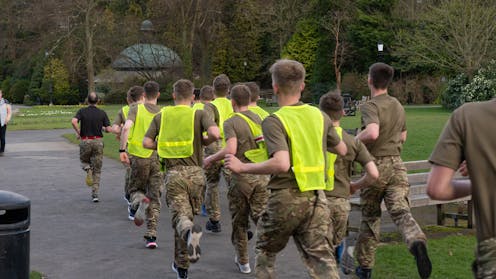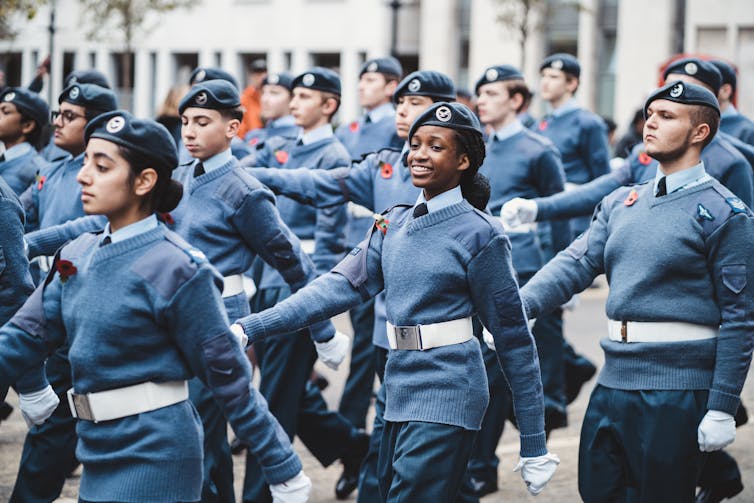
The UK government recently endorsed proposals in its strategic defence review to consider the creation of military gap years for young people in the UK.
It would potentially be similar to a scheme offered by the Australian Defence Force. Young Australian citizens can spend 12 months doing paid work in a variety of roles in the Navy, Army or Air Force.
In Australia in 2023, 664 young people enlisted in the gap year programme, and 374 of these transferred on to a role in the permanent Australian Defence Force. Like in Australia, the gap year model in the UK would be optional and for over 18s to get a “taste” of military life.
These gap years would be a part of recruitment strategy. The proposal comes at a time of global geopolitical crisis, national youth unemployment and a shortage of soldiers (a global problem).
Get your news from actual experts, straight to your inbox. Sign up to our daily newsletter to receive all The Conversation UK’s latest coverage of news and research, from politics and business to the arts and sciences.
Another key reason for the introduction of these gap years, highlighted in defence secretary John Healey’s oral statement on the review, is to “reconnect the nation with those who defend us”. Keir Starmer, in his speech, spoke of “a new spirit of service, flowing from every part of society … everyone benefiting, everyone playing their role”.
Young people are seen as a key part of building these connections. Another avenue raised in the review is to increase the number of cadet forces, a voluntary uniformed national youth organisation for teenagers that can also be linked to schools.
An evaluation of cadet forces in the UK has outlined significant positive outcomes for young people, including for their employment and career prospects.

The strategic defence review also proposed “working with the Department for Education to develop understanding of the armed forces among young people in schools”, but details of this are still unclear.
These suggestions form part of a trend towards increasing military presence in children and young people’s lives. My research has found that, over the last decade, successive UK governments have encouraged programmes with a military ethos within schools and character education to foster grit and gumption.
Watered-down national service?
My research shows that calls to reintroduce some form of military service appear at times of political, social or economic crisis. It’s not surprising then, that in the last few years we have seen several proposals in this area. Most notable is previous prime minister Rishi Sunak’s election pledge in 2024 that school leavers would have to do a year of compulsory military or voluntary service.
A voluntary gap year – national service “lite” – would be a more palatable approach compared to formal conscription, which is still active in several countries.
Starmer has been keen to distance himself from the language of national service, especially as he has also committed to introducing votes at 16: compulsory national service doesn’t poll well with young people.
The UK has also recently scrapped its voluntary National Citizen Service, a non-military, short-term youth programme centred on local community action that has cost over £1.5 billion since 2010.
But the fact that two successive prime ministers in the space of one year have pitched some form of military experience for school leavers tells us that this is not necessarily about benefits for youth, but about the concerning geopolitical landscape and the urgent need to boost recruits.
In 2025 compared to the last few decades, the state’s concern is less about youth crime, apathy or patriotism, but rather growing international security threats and the nation’s preparedness.
It is important to remember that the debate about national service in the UK is fuelled by generational nostalgia. In the UK, formal national service ran from the late 1940s to early 1960s for men aged between 17 and 21. Ever since those final troops were discharged in 1963, there has been a debate about “returning” to national service.
Research shows that those who were actually part of compulsory national service after the second world war generally don’t think we should bring it back. This debate is cyclical, and each time it happens, it reveals what the state and adults think about young people more generally, usually shaped by moral panics.
Would a gap year be popular?
Given the current economic climate, it could be that a paid short-term year of military service is more attractive to UK teenagers and their CVs than ever before. However, we must reflect on why it might be so attractive in the present moment and understand the wider, structural issues shaping the lives of children and young people today.
The costs of austerity and inequality in the UK run deep for children and young people. These issues cannot be solved by a defence focused gap year and there are other pressing demands to support young people in this country. For example, youth sector representatives are urging the UK government to reverse the long-term decline in funding on youth services.
The impetus for a military gap year in the report is strategic defence, not unemployment. But there is no guarantee the defence sector itself will be keen to embrace this idea.
When Sunak proposed national service last year, defence experts and ministers raised concerns about the British Army and Navy’s current capacity and resources to deliver such a programme. They also highlighted the potential impact of such a scheme on the morale of professional, dedicated and highly-skilled force personnel.
The actual feasibility of any new programme is uncertain, especially with the current fiscal situation. One thing my research suggests is certain though, is that this national debate will circle back around again and again.
Sarah Mills has received research funding from UKRI (ESRC), the British Academy and the Royal Geographical Society. She is currently an unpaid member of the advisory 'College of Experts' group of researchers for the Department of Culture, Media and Sport (UK Government) https://www.gov.uk/government/groups/dcms-college-of-experts
This article was originally published on The Conversation. Read the original article.







